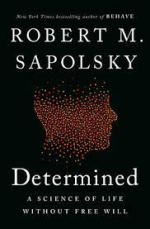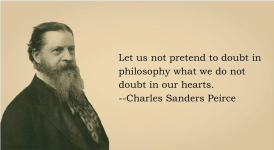- Joined
- Nov 18, 2016
- Messages
- 48,127
- Reaction score
- 25,382
- Gender
- Male
- Political Leaning
- Liberal
I know this subject has been brought up many times but I wanted to give it another stab.
If free will is an illusion, we most likely will never know it. Who or what could possibly calculate every predetermined cause and effect? You'd have to know every single action and reaction that happened in the universe on a subatomic level, which is beyond even the most powerful computers.
From the beginning to the end of time, Einstein envisioned a fixed, 'block universe.' Meaning that anyone outside of time/space could view existence, as a whole, from start to finish. So, even if from the first two particle collisions everything is determined afterward, it still appears as free will as far as we can tell.
Feel free to correct the above statements if they're wrong. But did you decide to do it or are you compelled by destiny?

The clockwork universe: is free will an illusion?
The long read: A growing chorus of scientists and philosophers argue that free will does not exist. Could they be right?www.theguardian.com
-- The difficulty in explaining the enigma of free will to those unfamiliar with the subject isn’t that it’s complex or obscure. It’s that the experience of possessing free will – the feeling that we are the authors of our choices – is so utterly basic to everyone’s existence that it can be hard to get enough mental distance to see what’s going on. Suppose you find yourself feeling moderately hungry one afternoon, so you walk to the fruit bowl in your kitchen, where you see one apple and one banana. As it happens, you choose the banana. But it seems absolutely obvious that you were free to choose the apple – or neither, or both – instead. That’s free will: were you to rewind the tape of world history, to the instant just before you made your decision, with everything in the universe exactly the same, you’d have been able to make a different one.--
Buddhists have always said no, we have no free will, and it's just an illusion.
But now it seems that modern science is joining that viewpoint:
"One of our greatest behavioral scientists, the bestselling author of Behave, plumbs the depths of the science and philosophy of decision-making to mount a devastating case against free will, an argument with profound consequences
Robert Sapolsky’s Behave, his now classic account of why humans do good and why they do bad, pointed toward an unsettling conclusion: We may not grasp the precise marriage of nature and nurture that creates the physics and chemistry at the base of human behavior, but that doesn’t mean it doesn’t exist. Now, in Determined, Sapolsky takes his argument all the way, mounting a brilliant (and in his inimitable way, delightful) full-frontal assault on the pleasant fantasy that there is some separate self telling our biology what to do.
Determined offers a marvelous synthesis of what we know about how consciousness works—the tight weave between reason and emotion and between stimulus and response in the moment and over a life. One by one, Sapolsky tackles all the major arguments for free will and takes them out, cutting a path through the thickets of chaos and complexity science and quantum physics, as well as touching ground on some of the wilder shores of philosophy. He shows us that the history of medicine is in no small part the history of learning that fewer and fewer things are somebody’s “fault”; for example, for centuries we thought seizures were a sign of demonic possession.
Yet, as he acknowledges, it’s very hard, and at times impossible, to uncouple from our zeal to judge others and to judge ourselves. Sapolsky applies the new understanding of life beyond free will to some of our most essential questions around punishment, morality, and living well together. By the end, Sapolsky argues that while living our daily lives recognizing that we have no free will is going to be monumentally difficult, doing so is not going to result in anarchy, pointlessness, and existential malaise. Instead, it will make for a much more humane world."


